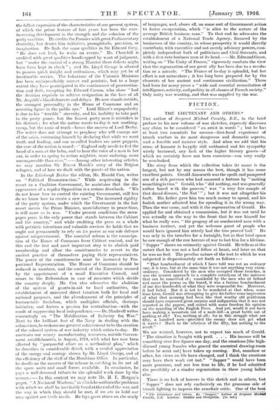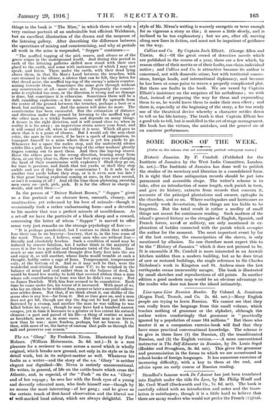FICTION.
THE LIEUTENANT AND OTHERS.* - Tits author of Sergeant Michael Cassidy, R.E., in the brief preface to his new volume of war sketches, expressly disavows any claim to be considered " an artist in words " ; but he has at least two essentials for success—first-hand experience of trench warfare in its most dangerous and dramatic aspects, and a forcible and incisive style. And when we add that his sense of humour is happily still unblunted and his sympathy wisely bestowed, any lack of the higher literary graces—of which we certainly have not been conscious—can very easily be overlooked.
The story from which the collection takes its name is the longest, but not by any means the best, though it has some excellent points. Gerald Ainsworth was the spoilt and pampered son of a rich parvenu who had. amassed a fortune by " making something in tins." Gerald, who " did nothing, and was generally rather bored with the process," was " a very fair sample of that dread disease, ' the Nut ' " ; but it was not altogether his fault. His father gave him too much money to spend, and his foolish mother admired him for spending it in the wrong way. Then the war came, and with it the regeneration of Gerald. He applied for and obtained a commission, but it was not until he was actually on the way to the front that he saw himself for what he really was, " the progeny of an uneducated man with a business instinct, and yet the welcome guest of people who would have ignored him utterly had the tins proved bad." Ho was only in the trenches for a fortnight, but in that brief space he saw enough of the raw horrors of war to last him for a lifetime. " Sapper " shows no animosity against Gerald. He tells us at. the outset that he was not a bad fellow at heart, and later on that he was no fool. The peculiar nature-of the test to which he was subjected is dispassionately set forth as follows :—
" That bombardment of which I have told was not an ordinary one, it is true, but at the same time it was not anything very extra- ordinary. Considered by the men who occupied those trenches, it was the nearest approach to.a complete cataclysm of the universe that can be conceived of.; considered by the men who sit behind and move the pawns on the board, it was a furious bombardment of one five-hundredth of what they were responsible for. Moreover, it had failed. But it is not to be .wondered at that when, some time later, Gerald was attempting to give his father some impression of what that morning had been like that worthy old gel:Mei:eau should have expressed great surprise and indignation that it was not reported in the papers, and stated with some freedom • his opinion on the muzzling of the English. Press. And yet, would it not have been making a mountain out of a mole-hill—a great battle out of nothing at all ? Yes, nothbig at all ; for in this struggle whit. are fifty, a hundred men—provided the enemy :does not get what it wants ? Much to the relative's of the fifty, but nothing to the
result." .
We are warned, however, not to expect- too much of Gerald. " The situation is fraught with peril. . .7. His income will be
something over five figures one day, and the creations [the high- dizened young females who graced the ancestral drawing-room before he went out] have taken up nursing. But, somehow or other, his views on life have changed, and I think the creations may have their work ea but" " Sapper " would have been more generous, and not less true to life, if he had admitted
the possibility of a similar regeneration in ;these young ladies also.
There is no lack of horrors in this sketch and in others, but Sapper " does not rely exclusively on the gruesome side of trench fighting to impress the armchair critic. One of the best
• The Ideutestant and Others. By "-Sapper," Author of Sergeant Michad Cassidy, ILE. London : Hodder and Stoughton. Als. net.I.
things in the book is " The Mine," in which there is not only a very curious portrait of an undesirable but efficient Welshman, but an excellent illustration of the drama and the suspense of the listening gallery. After describing the difference between the operations of mining and countermining, and why at periods all work in the mine is suspended, " Sapper " continues :—
" The muffled tapping of the pick ceases, and silence as of the grave reigns in the underground world. And during this period in each of the listening galleries skilled men stand with their ears glued to the earth, and some with instruments of which I may not speak, and listen. There under the earth, with their dead lying above them, in that No Man's Land between the trenches, with ears strained in the silence, a silence that can be felt, they listen for that dread noise, the muffled tap-tap of the enemy's miners counter- mining towards them. Sometimes the mine goes through without any countermine at all—more often not. Frequently the counter- mine is exploded too soon, or the direction is wrong and no damage is done, but sometimes it is otherwise. Sometimes there will be a dull, rumbling explosion—a few mine cases will fly upwards from the centre of the ground between the trenches, perhaps a boot or a head, but nothing more. And the miners will mine no more. The countermine has been successful. But the estimation of distance and direction under the ground by listening to the muffled tap of the other man is a tricky business, and depends on many things. A fissure in the right direction, and it will sound close to, when in reality it is far away ; an impervious strata across your front, and it will sound afar off, when in reality it is near. Which all goes to show that it is a game of chance. But I would ask the arm-chair critic, the man in the street, if he have a spark of imagination, to transport himself to a mine where there is yet ten yards to go. Whenever for a space the moles stop, and the underwold silence settles like a pall, they hear the tap-tap of the other workers' ghostly lingers coming out to meet them. And then the tap-tap ceases. Have the others gone in the wrong direction, bearing away from them, or are they close to, three or four feet away even now charging the head of their countermine with explosive ? Shall they go on, for time is precious, and finish that ten yards, or shall they stop awhile and see if they fire their countermine ? Is it safe to do another two yards before they stop, or is it even now too late ? Is that great tearing explosion coming at once, in the next second, or isn't it coming at all ? And all the time those glistening, sweating men carry on—pick, pick, pick. It is for the officer in charge to decide, and until then—"
In the person of " Driver Robert Brown," " Sapper " gives us a fine portrait of an obscure hero, uncouth, clumsy, and unattractive, yet redeemed by his love of animals—though it occasionally took a rather embarrassing form—and a devotion to his master that was a perfect miracle of unselfishness. As a set-off we have the portraits of a black sheep and a coward, concerning the latter of whom " Sapper " is moved to offer some very just remarks on the strange psychology of fear :-
" It is perhaps paradoxical, but I venture to think that without fear there can be no bravery—bravery, that is, in the true sense of the word. There are, I believe, some men who are without fear— literally and absolutely fearless. Such a condition of mind may be induced by sincere fatalism, but I rather think in the majority of cases it is due to a peculiar and fortunate twist of the brain. Inas- much as one man will without thought dive forty feet into the sea and enjoy it, so will another, whose limbs would tremble at such a thought, boldly enter a cage of lions. Temperament, temperament only, at the bottom of it. And so it may well be that, were the wonderful soul-stirring heroism of some V.C. to be weighed in the balance of mind and soul rather than in the balance of deed, he would be found less worthy to hold that coveted ribbon than a man whose sole contribution to fame was that he didn't run away. Not so James Dawlish. With him fear seemed to be cumulative. Each time he came under fire, his terror of it increased. With most of us, who lay no claim to be without fear, sooner or later a merciful callous- ness settles down. Not that, if we think about it, our dislike of the genus °bus is any less—far from it. But as time goes on, and a man does not get hit, though one day the dug-out he had just left was flattened by a crump, and another the man he was talking to was killed before his eyes ; though he may have had a hundred narrow escapes, yet in time it becomes to a greater or less extent his natural element—a part and parcel of his life—a thing of routine as much as breakfast, more so, in some cases. But that man is no braver now than he was-: more fearless, perhaps, but no braver. It is then, with most of us, the factor of custom that pulls us through the
mill and preserves our reason." .



















































 Previous page
Previous page